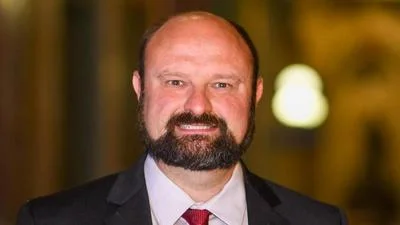Contributed photo
Contributed photo
U.S. Rep. John Shimkus (R-IL) hopes to rebalance the cogs in the federal congressional gears through his aspirations to become the next chairman of the House Committee on Energy and Commerce.
Specifically, Shimkus has pledged to help Congress regain the power invested in it as the nation’s lawmaking arm, and has focused on a case of particular interest and import to the next congressional session.
The lifelong resident of Collinsville has represented the state in Washington since 1997, first from the 20th District and from 2003 until 2013, from the 19th District. Currently, he represents Illinois’ 15th Congressional District.
Appealing both to his party colleagues and the GOP Steering Committee, which makes recommendations to the party at large, Shimkus plans to emphasize the potential impact of court decisions on policies that come under the domain of the Energy and Commerce faction, spokesman Jordan Haverly said.
In particular, Shimkus is zeroing in on striving to negate the “Chevron Deference,” a legal principle that empowers government agencies to interpret the meaning of statutes that come up for question. Although a potentially difficult task, Shimkus envisions reinstating power that ought to belong to the legislative branch.
The Chevron Deference originated in a 1984 U.S. Supreme Court decision involving energy company Chevron and the Natural Resources Defense Council Inc. group. The bill laid the groundwork for federal agencies to wield authority in interpreting laws needing clarification -- then to base new laws based on those interpretations.
The reason for Chevron’s current significance lies in the likelihood of the next Congress addressing the measure, still awaiting approval from the Senate as H.R. 4768, the Separation of Powers Restoration Act, after the House passed it in July.
If passed, it would enable Congress to override the Chevron Deference, law professors from University of California, Berkeley and NYU have said. If abandoned, however, the interpretation of statutes would most likely transfer back to the judicial branch.
“Our success in this area will restore Congress as the sole lawmaking apparatus of the federal government,” Shimkus said.
Having served on the Committee on Energy and Commerce, including four of its subcommittees, for two decades, he ranks senior to his nearest rival for the chairmanship — Rep. Greg Walden (R-OR) — but may face close competition, as the latter chairs the committee’s Communications and Technology Subcommittee and also happens to chair the National Republican Congressional Committee (NRCC).
Additionally, Walden raised over $4 million for various House Republicans during this election year. U.S. Rep. Joe Barton’s (R-TX) name also has come up in the preliminary round of contenders for the committee chairmanship, but term limits render Barton’s candidacy unlikely.
During his long Energy and Commerce committee tenure, Shimkus has gone on record to champion many issues, calling for food safety, questioning the wisdom of spending taxpayer dollars on climate change and supporting construction of the Keystone pipeline. Now, he is focusing on the checks and balances of the nation’s executive agencies as he vies for leadership of the group.
Earning his bachelor’s degree from the U.S. Military Academy in West Point, New York, Shimkus served both in the U.S. Army and Army Reserves, retiring in 2008 as a lieutenant colonel. Subsequently, he earned a teaching certificate from Christ College Irvine (now Concordia University Irvine) in Irvine, California, as well as an MBA from Southern Illinois University Edwardsville.
Within the scope of his work on the Energy and Commerce Committee, Shimkus has served on the Subcommittee on Communications and Technology, the Subcommittee on Energy and Power, the Subcommittee on Environment and the Economy (as chairman) and the Subcommittee on Health.






 Alerts Sign-up
Alerts Sign-up